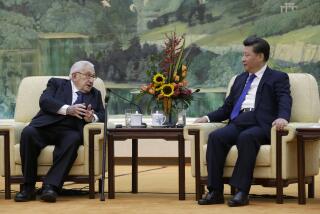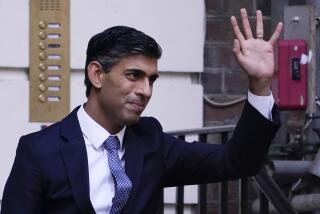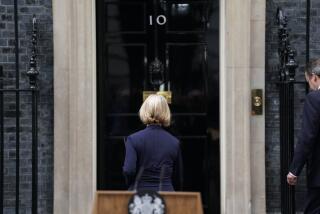Now Showing: Tony and George’s Excellent Adventure
- Share via
LONDON — There’s a new star on the world stage since Sept. 11, a new No. 2 in the global world order: Britain’s prime minister, Tony Blair.
Putting aside the 50 years when Britain was seen as a middle-ranking country off the coast of continental Europe, Blair is conducting himself as George W. Bush’s co-star. He has made the key diplomatic missions to Moscow, Islamabad, New Delhi and Oman. His address to the Labor Party conference in Brighton was even hailed as the mission statement for Operation Enduring Freedom.
Some are beginning to wonder who’s the senior partner on the team. One newspaper cartoon here depicted the pair as Batman and Robin, with the British Robin towering over a puny Batman Bush.
The result is a higher U.S. profile for Blair than for any British prime minister since Margaret Thatcher. One poll of U.S. voters for London’s Sunday Telegraph found that 41% of respondents would back Blair for president.
Luckily for President Bush, the U.S. Constitution allows no such thing, which means the two men can carry on becoming best buds. Since Sept. 11, no foreign leader has been closer to the U.S. president. Blair was first on the phone and wasted no time in visiting the World Trade Center site. He was seated next to First Lady Laura Bush when her husband spoke to Congress, basking in two ovations. Blair has returned the compliment, constantly paying tribute to the president’s “statesmanship.”
This is quite a contrast with the first, faltering steps in the Bush-Blair story. Most Brits assumed the “special relationship” between London and Washington would be stashed in the deep freeze the day Bill Clinton left the White House. Blair and Clinton had been political soul mates--both modernizers of center-left parties. When Bush chose to make Mexican President Vicente Fox the first foreign guest at his Crawford ranch, both scuffing their cowboy boots in the Texas dust, London got the message: You’re no longer No. 1.
The first Blair-Bush summit at Camp David only made matters worse. When one reporter asked what the two have in common, Bush replied, “We both use Colgate toothpaste.” To British ears, that sounded like an insult, a coded way of saying “nothing.” Now those days seem very far away. Poor Fox must feel like a sweetheart abandoned.
For Blair, this new role has paid handsome dividends. His critics have been silenced, with even previous skeptics admitting that Blair shows a clarity of purpose in war rarely on display in peacetime.
There has been the odd dissenting grumble. While Blair once was accused of lacking firm goals or of aiming too low, now, as in Kosovo in 1999, he faces the opposite charge: that he is almost dogmatically certain of his cause and absurdly overambitious (he told the Labor Party that his aim was to “reorder this world”).
But the crisis has consolidated Blair’s position. And the timing has been uncannily beneficial. The Sept. 11 attacks came hours before opposition Conservatives were to elect a new leader, ensuring that the winner, Iain Duncan Smith, got no media coverage. The start of military action coincided with the Conservatives’ conference, again imposing a media blackout on Duncan Smith’s debut.
Blair may be barred from high office in the U.S., but as a world leader, there seems to be no limit to his rise.
More to Read
Sign up for Essential California
The most important California stories and recommendations in your inbox every morning.
You may occasionally receive promotional content from the Los Angeles Times.










